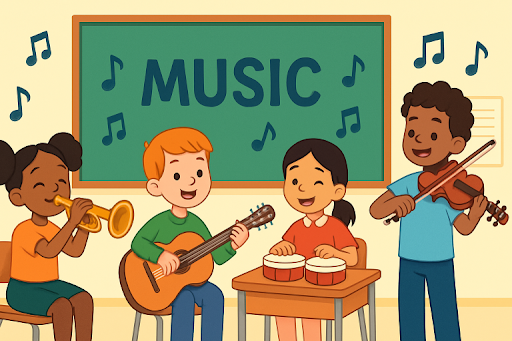Music education is evolving into a dynamic force that goes far beyond learning to play an instrument. By nurturing cognitive development, interpersonal skills, and self-expression, modern music education is equipping students with the tools they need for lifelong success. Innovative educators continually adopt new approaches and frameworks, ensuring students have meaningful and accessible musical experiences. For those seeking additional classroom inspiration, here’s where music teachers can find quality resources that can support curriculum and creativity alike. Schools and local organizations alike are discovering that music can be a foundation for broader academic and personal achievement.
Classrooms from New Jersey to California are showing how music is more than just a subject—it’s a catalyst for overall student growth. Creative initiatives, such as community performances or gamified theory apps, are transforming traditional band rooms into spaces for genuine innovation and inclusive learning. These approaches not only spark a deeper interest in music but also foster a sense of belonging. Through music, students discover their unique voices, connect with their peers, and build resilience for challenges both inside and outside of school.
Music education’s impact isn’t limited to cognitive growth or academic scores. Its benefits extend to health, emotional regulation, and even community pride. By expanding music access and experimenting with new teaching methodologies, schools are discovering their ability to foster well-rounded student development. Whether through after-school programs, music technology, or mentorship opportunities, young musicians are finding new ways to express themselves and achieve success.
As the importance of arts education continues to gain attention, it’s vital to highlight creative models, effective resources, and impactful results. Collective efforts from teachers, administrators, and local supporters are paving the way for a more harmonious future where every child can realize their full potential through music.
Cognitive Benefits of Music Education
Music education amplifies more than a child’s sense of rhythm; it fundamentally strengthens cognitive abilities like memory, attention, and executive function. Numerous studies have shown that students who consistently engage with music demonstrate marked improvements in academic performance, thanks in part to the brain’s enhanced connectivity and neuroplasticity. Programs at schools such as Creative Arts High School in Camden, New Jersey, illustrate this link, where the discipline and focus learned through music correlate directly with higher grades and graduation rates.
Research also suggests that early exposure to music can lead to lifelong gains in literacy and numeracy. Learning to decode musical notation exercises the same neural pathways used for reading and mathematics, thereby providing a valuable early advantage for young learners. Just as importantly, playing in ensembles fosters problem-solving skills and quick, strategic thinking—abilities that reinforce academic success across disciplines.
Innovative Programs in Music Education
Creativity thrives in music classrooms that foster innovation and empower students. The “12 Days of Practice” challenge at Katonah Elementary School exemplifies how structured yet playful programs can encourage regular practice and lasting engagement. By offering incentives like special lunches, schools foster a sense of achievement and camaraderie among students, making music a highlight of their academic experience.
Other schools have adopted residency programs, bringing in professional musicians to mentor students or co-create original compositions. Such hands-on approaches diversify the learning experience and promote self-confidence, collaboration, and leadership skills. Incorporating personalized learning pathways is vital, ensuring that students of all backgrounds and skill levels can participate, contribute, and feel valued.
Community Involvement in Music Education
Strong music education programs often thrive thanks to robust community partnerships. From local businesses sponsoring concerts to universities providing student mentors, these collaborations ensure that music education is accessible and sustainable. Events like “music nights” not only raise funds but also foster intergenerational connection and civic pride.
In many communities, local orchestras and music foundations partner with schools to donate instruments or hold workshops, thereby expanding access to music for those who might otherwise be unable to participate. The strengthening of these community bonds translates into more resilient and valued music programs, creating a ripple effect throughout the broader educational landscape.
Technology Integration in Music Learning
Technology is opening up new frontiers in music education, making high-quality instruction and interactive experiences available far beyond the traditional classroom. Innovative tools like ArchiTone—a colorful, LEGO-inspired platform—enable students to visualize complex theory concepts and experiment with composition in a gamified environment. These platforms cater to diverse learning styles, making music theory more accessible, particularly for students with unique educational needs.
Online tutorials, virtual reality orchestras, and cloud-based production software are also breaking down geographic and socioeconomic barriers, allowing students to collaborate and learn anytime, anywhere. By embracing these technological advances, educators can create inclusive, culturally relevant music programs that resonate with today’s digital learners.
Overcoming Challenges in Music Education
Despite its proven benefits, music education still faces major challenges, particularly in districts affected by funding shortfalls. Organizations such as The Mr. Holland’s Opus Foundation are essential in bridging these gaps, providing instruments and resources to under-resourced schools so every child can participate. Grants, donations, and advocacy remain vital for schools facing budget constraints, but community action and dedicated music educators are often the key difference-makers.
Continued innovation, creative partnerships, and ongoing advocacy are key to ensuring music remains a core component of education—not a privilege for the few, but an opportunity for all.
Conclusion
Music education stands as a pillar of holistic development and academic excellence. By investing in effective programs, nurturing creative teaching methods, and leveraging technology, educators and communities can ensure that music is accessible, relevant, and empowering for every student. The multifaceted benefits of music ripple throughout schools and neighborhoods, cultivating not just skilled musicians but resilient, accomplished, and inspired young people ready to succeed in every area of life.







